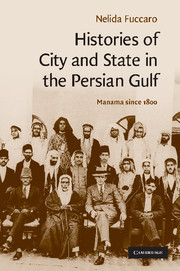Book contents
- Frontmatter
- Contents
- List of illustrations
- List of maps
- Acknowledgements
- Note on transliteration and terminology
- Glossary
- List of abbreviations
- Map 1 The Persian Gulf and Bahrain in the regional context
- Map 2 Bahrain's settlements
- CAMBRIDGE MIDDLE EAST STUDIES 30
- Introduction
- 1 Indigenous state traditions and the dialectics of urbanisation in Bahrain, 1602–1923
- 2 The making of Gulf port towns before oil
- 3 Ordering space, politics and community in Manama, 1880s–1919
- 4 Restructuring city and state: the municipality and local government
- 5 ‘Disorder’, political sociability and the evolution of the urban public sphere
- 6 City and countryside in modern Bahrain
- Conclusion
- Bibliography
- Index of persons, tribes and families
- Index of subjects
- Index of places
1 - Indigenous state traditions and the dialectics of urbanisation in Bahrain, 1602–1923
Published online by Cambridge University Press: 20 January 2010
- Frontmatter
- Contents
- List of illustrations
- List of maps
- Acknowledgements
- Note on transliteration and terminology
- Glossary
- List of abbreviations
- Map 1 The Persian Gulf and Bahrain in the regional context
- Map 2 Bahrain's settlements
- CAMBRIDGE MIDDLE EAST STUDIES 30
- Introduction
- 1 Indigenous state traditions and the dialectics of urbanisation in Bahrain, 1602–1923
- 2 The making of Gulf port towns before oil
- 3 Ordering space, politics and community in Manama, 1880s–1919
- 4 Restructuring city and state: the municipality and local government
- 5 ‘Disorder’, political sociability and the evolution of the urban public sphere
- 6 City and countryside in modern Bahrain
- Conclusion
- Bibliography
- Index of persons, tribes and families
- Index of subjects
- Index of places
Summary
Before the discovery of oil, the presence of water and the rich pearl fisheries of Bahrain supported the growth of towns and agricultural hamlets. The continuity of settlement can also be readily explained by a long history of trade and by the political realities of a frontier society in flux. The strategic position of the islands favoured the consolidation of local administrations under the aegis of the regional powers and of the maritime and land empires which dominated the Gulf coast. Yet until the establishment of the Pax Britannica in the first half of the nineteenth century, the absence of fixed military and political frontiers fostered continuous instability throughout the region. Bahrain was a busy ‘buffer’ zone between the Arab and Iranian worlds and the point of intersection between the tribal and agricultural frontiers of the Persian Gulf. The coastline did not constitute a barrier but a permeable border in a region which had a long history of indigenous seafaring supported by an advanced maritime technology. Over the centuries, migrations from the mainland were the engine of political change as suggested by the sequence of dynasties of tribesmen, merchant seafarers and imperial administrators which ruled the islands. Newcomers had a profound influence on the economic and demographic make-up of Bahrain; the mainland was a reservoir of manpower but migrations could easily carry the seeds of societal and political collapse.
- Type
- Chapter
- Information
- Histories of City and State in the Persian GulfManama since 1800, pp. 16 - 42Publisher: Cambridge University PressPrint publication year: 2009

